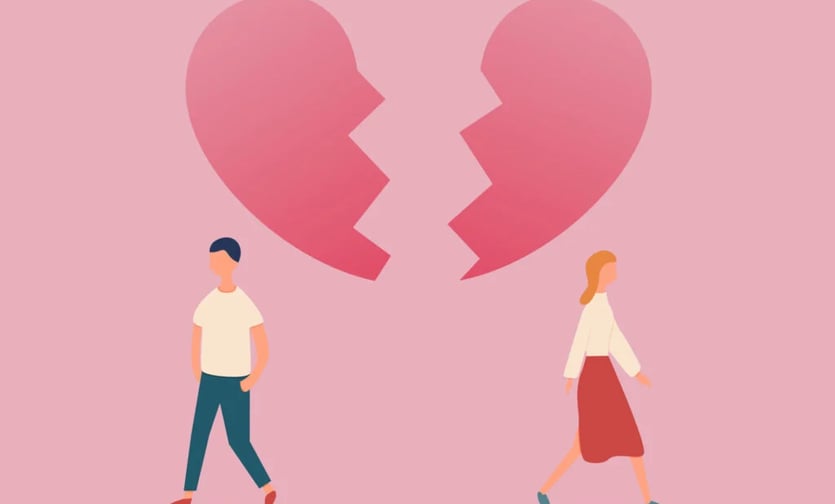Struggling to Accept It's Over : The Denial Phase of Breakup
The first stage of any breakup is often denial—struggling to accept that it’s truly over. It’s one of the toughest phases, as two people who once dreamt of a future together must now face reality. The mind clings to memories, hoping for a different outcome. Are you stuck in denial, finding it hard to move on? Read the article to understand this phase and learn how to navigate it with strength and clarity.
MENTAL WELLNESS
Deepita
3/17/20253 min read


In the beginning, everything feels magical—the honeymoon phase where love is exciting, dates are dreamy, and a shared future seems inevitable. But as time passes, reality sets in. Fights, misunderstandings, and disagreements start to creep in. Some couples work through them and come out stronger, but not everyone is that lucky.
When a breakup is mutual, both partners can share the blame for why things didn’t work out. But what happens when one person loses interest and walks away, leaving the other behind? That’s what we’re diving into today—how to cope when the person you love decides they no longer feel the same.
The first stage of a breakup is denial—the refusal to accept that it’s truly over. When you still want to be in the relationship, facing reality feels unbearable. You may find yourself questioning everything, blaming yourself, and searching for reasons to hold on. The uncertainty and pain can be overwhelming, leaving you unsure of how to move forward. But acceptance is the first step toward healing. While it’s easier said than done, countless people have gone through this phase and come out stronger. Here are some tips from those who have been in your shoes:
1. Allow Yourself to Feel
When a relationship ends, it’s normal to feel hurt, confused, or even numb. Many people try to suppress their emotions, thinking they should "stay strong" or "move on quickly." But ignoring your pain only delays the healing process.
What to do:
Cry if you need to. Letting emotions out is a sign of strength, not weakness.
Write in a journal. Putting your thoughts on paper helps you process them.
Avoid distractions that numb the pain. Drinking, partying excessively, or rebounding may seem like quick fixes, but they don’t help in the long run.
2. Stop Romanticizing the Past
When you're in denial, you often focus only on the good memories while ignoring the reality of why the relationship ended. You might tell yourself:
❌ “We were perfect together.”
❌ “Maybe if I had done things differently, they’d still be here.”
❌ “They were my soulmate.”
But ask yourself honestly—was it really perfect? Every relationship has flaws, and breakups don’t happen without a reason.
What to do:
Make a list of why the relationship didn’t work. Seeing it in writing can shift your perspective.
Talk to a trusted friend who can remind you of the not-so-great moments.
Accept that love alone isn’t enough. A relationship needs mutual effort, respect, and compatibility to last.
3. Limit Contact (Even if It's Hard)
One of the biggest mistakes people make is keeping in touch with an ex right after a breakup. You might convince yourself that "we can stay friends" or "I'll just check their social media to see how they're doing." But this only reopens the wound every time you see them moving on without you.
What to do:
Mute or unfollow them on social media. You don’t have to block them, but give yourself space.
Avoid texting or calling. If they truly cared, they wouldn’t have left—so don’t chase them.
Remove things that trigger memories. Put away old photos, gifts, or messages that keep you stuck in the past.
4. Talk It Out
Keeping emotions bottled up makes the pain heavier to carry. Many people think they should deal with breakups alone, but opening up helps you process emotions faster.
What to do:
Talk to a trusted friend or family member—someone who will listen, not judge.
Consider therapy if the breakup has affected your mental health deeply.
Join a support group or connect with others who’ve been through the same thing.
5. Focus on Yourself
After a breakup, it’s easy to feel lost—especially if you made your partner the center of your world. This is the perfect time to rediscover yourself.
What to do:
Pick up a new hobby. Always wanted to learn painting? Cooking? Now’s your chance.
Exercise & take care of your body. A breakup can drain you, but physical activity boosts mood and confidence.
Set new goals. Focus on things that excite you, whether it’s career, fitness, or personal growth.
6. Accept That Closure Comes from Within
Many people wait for closure—a final conversation, an apology, or an explanation. But the truth is, you may never get one. Not everyone gets a satisfying ending, and that’s okay.
What to do:
Accept that their decision is final. No amount of questioning will change it.
Find your own closure. Sometimes, closure comes when you realize you deserve better.
Shift your focus to the future. Instead of asking “Why did this happen to me?”, ask “What can I learn from this?”
Denial is just the first step of healing. It hurts, but it won’t last forever. Acceptance doesn’t mean forgetting—it means freeing yourself from the weight of the past.
Healing takes time, but with patience and self-love, you will get through this. And when you do, you’ll look back and realize this heartbreak was just a chapter, not your whole story.
You are stronger than you think, and better days are ahead.
